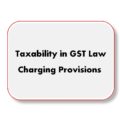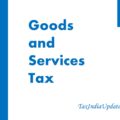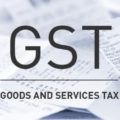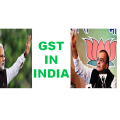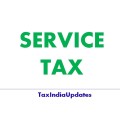Taxable Event under GST (Levy of GST): The charging event or levy is the event which determines whether an activity attracts the charge. However tax may be collected before or after the event for the sake of administrative certainty or convenience. Taxable event under GST Law is supply of goods or services or both. CGST and SGST/ UTGST will be levied on intra-State supplies whereas IGST will be levied on inter-State supplies.
The concept of ‘Supply’ is introduced first time in Indian Taxation System. In earlier law the event levy of tax was provided separately for each tax levied by government:
| Existing Indirect Tax Law | Taxable Event |
| The Customs Act, 1962 | Entry of goods in the territory of India |
| The Central Excise Act, 1944 | Manufacture of Excisable Goods |
| The Finance Act 1994 (Chapter V) i.e. Service Tax | Provision of a Taxable Service |
| Respective State VAT Act | Sale of goods |
Thus the levy of GST is occurred at the time of ‘Supply of Goods or Services’. It is pertinent here to discuss the relevant statutory provision reads as under:
Section 7 of the CGST Act 2017: Scope of supply.
(1) For the purposes of this Act, the expression “supply” includes–
(a) all forms of supply of goods or services or both such as sale, transfer, barter, exchange, licence, rental, lease or disposal made or agreed to be made for a consideration by a person in the course or furtherance of business;
(b) import of services for a consideration whether or not in the course or furtherance of business;
(c) the activities specified in Schedule I, made or agreed to be made without a consideration; and
(d) the activities to be treated as supply of goods or supply of services as referred to in Schedule II.
(2) Notwithstanding anything contained in sub-section (1),–
(a) activities or transactions specified in Schedule III; or
(b) such activities or transactions undertaken by the Central Government, a State Government or any local authority in which they are engaged as public authorities, as may be notified by the Government on the recommendations of the Council,
shall be treated neither as a supply of goods nor a supply of services.
(3) Subject to the provisions of sub-sections (1) and (2), the Government may, on the recommendations of the Council, specify, by notification, the transactions that are to be treated as—
(a) a supply of goods and not as a supply of services; or
(b) a supply of services and not as a supply of goods.
From simple reading of above provisions it may be presumed that the definition of supply is inclusive and thus of the widest possible connotation. The Supply is defined to include all forms of supply of goods and/or services such as sale, transfer, barter, exchange, license, rental, lease or disposal made or agreed to be made for a consideration by a person in the course or furtherance of business. It also includes importation of services for a consideration whether or not in the course or furtherance of business.
It may be noted that a supply will involve two independent persons. However, GST makes transactions between two branches of the same legal entity in different States/ countries or two different registrations within the same State also taxable under GST. Transactions of supply of goods between principals and agents which are not subject to tax in present regime are taxable supplies under GST as these have been treated as supplies under Schedule I of the CGST Act.
Charging Provisions for Levy of GST
Section 9 (Levy and collection) is the charging provision of the CGST Act. It provides that all intra-State supplies would be liable to CGST. The levy is on supply of all goods or services or both except on the supply of alcoholic liquor for human consumption. Besides, supply of petroleum crude, high speed diesel, motor spirit (petrol), natural gas and aviation turbine fuel are also included in GST. However, the tax will be levied on these goods only with effect from such date as may be notified by the Government after recommendation of the Council. It also provides for the value on which tax shall be paid, the maximum rate of tax i.e. 20% that can be levied on such supplies, the manner of collection of tax by the Government and the person who will be liable to pay such tax.
Tax liability on Composite and Mixed supplies
Section 8 of CGST Act, 2017 deal with levy of GST on Composite and Mixed supplies of goods or services. The provisions of section 8 is as under:
8.Tax liability on composite and mixed supplies.
The tax liability on a composite or a mixed supply shall be determined in the following manner, namely:—
(a) a composite supply comprising two or more supplies, one of which is a principal supply, shall be treated as a supply of such principal supply; and
(b) a mixed supply comprising two or more supplies shall be treated as a supply of that particular supply which attracts the highest rate of tax.
The Section 2(74) defined the term “mixed supply” means two or more individual supplies of goods or services, or any combination thereof, made in conjunction with each other by a taxable person for a single price where such supply does not constitute a composite supply.
Illustration.— A supply of a package consisting of canned foods, sweets, chocolates, cakes, dry fruits, aerated drinks and fruit juices when supplied for a single price is a mixed supply. Each of these items can be supplied separately and is not dependent on any other. It shall not be a mixed supply if these items are supplied separately;
The term ‘Composite Supply’ is not specifically defined under CGST Act, 2017. However in common parlance a composite supply means a supply comprising two or more taxable supplies of goods or services, or any combination thereof, which are naturally bundled and supplied in conjunction with each other in the ordinary course of business, one of which is a principal supply.
Liability to Collect and Deposit GST
In the normal course, the Tax would be payable by the supplier of goods and / or services. However, in specific cases ( Section 9 (3) & (4) of the CGST, Act 2017), the onus of payment of tax is shifted to the recipient of goods and / or services. To impose tax on reverse charge basis, the following conditions would be mandatory:
(a) Notification to be issued by the Central Government specifying the categories of supply of goods and / or services
(b) Should be notified only on recommendation of the Council.
Composition Scheme under GST Law
Section 10 of CGST Act 2017 deals with the GST Composition Scheme for payment of tax by eligible taxable persons. The registered person is eligible to opt GST Composition Scheme only on fulfillment of following conditions:
- he is not engaged in the supply of services other than supplies referred to in clause (b) of paragraph 6 of Schedule II;
- he is not engaged in making any supply of goods which are not leviable to tax under this Act;
- he is not engaged in making any inter-State outward supplies of goods;
- he is not engaged in making any supply of goods through an electronic commerce operator who is required to collect tax at source under section 52; and
- he is not a manufacturer of such goods as may be notified by the Government on the recommendations of the Council.
Points to be Kept in Mind about Composition Levy in GST
- In case where more than one registered persons are having the same PAN, the registered person is not eligible to opt for GST Composition Scheme unless all such registered persons opt to pay tax under GST Composition Scheme.
- The option of GST Composition Scheme availed of by a registered person shall lapse with effect from the day on which his aggregate turnover during a financial year exceeds the limit specified i.e. 75 lacs.
- A taxable person who opt GST Composition Scheme shall not collect any tax from the recipient on supplies made by him nor shall he be entitled to any credit of input tax.
- In case proper officer has reasons to believe that a taxable person who opt GST Composition Scheme despite not being eligible, such person shall, in addition to any tax that may be payable by him under any other provisions of this Act, be liable to a penalty and the provisions of section 73 or section 74 shall, mutatis mutandis, apply for determination of tax and penalty.

